As a 21st century school librarian you want projects to guide your students into becoming global and digital citizens.
As a 21st century school librarian you want projects to guide your students into becoming global and digital citizens.
 It’s raining, and it’s chilly. The house feels dark even with lots of lights on. I just want to curl up with a book and hibernate. I am fairly disciplined. My to-do list is always nearby, clearly listing everything needing to get done. But some days it’s hard to find the energy – or the will—to tackle it.
It’s raining, and it’s chilly. The house feels dark even with lots of lights on. I just want to curl up with a book and hibernate. I am fairly disciplined. My to-do list is always nearby, clearly listing everything needing to get done. But some days it’s hard to find the energy – or the will—to tackle it.
It seemed a bit self-indulgent to use this blog to ruminate on procrastinating and feeling lazy, but we all have to deal with days when focusing on tasks seems like very hard work. How do you turn it around? What can you do to re-charge yourself?
My first rule is to accept where I am. Trying to argue myself out of what I am feeling is not going to change anything. I mentally congratulate me for how much I have accomplished in the past several days. I earned a bit of a break. With this mind set, I can enjoy not working for a bit rather than ruin it with self-deprecating thinking. That only extends the time it takes for me to return to the tasks in hand and makes me unhappy with who I am.
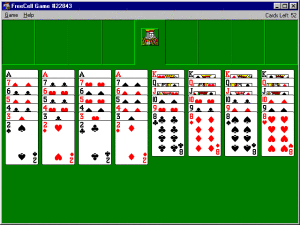 Next rule is to do something I enjoy for a while. I may take an hour to read or thirty minutes to play solitaire on the computer (a personal addiction) or fool around on my Facebook page. Do I adhere to the time limit I set? Not always – particularly if I am playing solitaire. But after a while the time off feels complete and I am ready to return.
Next rule is to do something I enjoy for a while. I may take an hour to read or thirty minutes to play solitaire on the computer (a personal addiction) or fool around on my Facebook page. Do I adhere to the time limit I set? Not always – particularly if I am playing solitaire. But after a while the time off feels complete and I am ready to return.
It struck me this has implications for us as librarians on the job. There are days you are worrying about some personal problems or the commute to work has left you frazzled. Unless you give yourself a break and acknowledge where you are, you are apt to find the students are acting up and the teachers are being demanding, and basically you feel as though you are always giving and never receiving.
Decide to whatever extent is possible, that at least for a while you will look for the fun. If you are an elementary librarian, choose a few humorous books for storytime. With older students try to give a twist to your lessons. For example, you can point them to this Search Engine List and suggest they try one of the ones they have never used (or heard of) and then compare their results from it with Google. By altering course, you will get back on course more quickly.
And finally, put a smile on your face–even if you don’t feel like smiling. Others will smile back and it will lift your spirits.
Here’s to putting sunshine back in your life –and mine.
 Until the middle of the 20th century, Literacy meant one thing – you could read. It sometimes was modified with the word “functional” to indicate you were capable of reading at a sufficient level to survive in our society. Today Literacy almost never stands by itself – and yet, the important of the basics hasn’t changed .
Until the middle of the 20th century, Literacy meant one thing – you could read. It sometimes was modified with the word “functional” to indicate you were capable of reading at a sufficient level to survive in our society. Today Literacy almost never stands by itself – and yet, the important of the basics hasn’t changed .
Librarians talk of informational literacy and digital literacy. Educators and parents are concerned about financial literacy. With the emphasis on STEM, there is increased reference to numeric or quantitative literacy.
Another important concerns is Transliteracy. It’s defined as “the ability to read, write and interact across a range of platforms, tools and media from signing and orality through handwriting, print, TV, radio and film, to digital social networks.” (www.transliteracy.com). In an age of multiple devices and means of connecting with people and sharing information it is certainly a critical skill.
Those dealing with adults also discuss legal literacy and health literacy. If you have ever tried reading a legal document or dealt with health care policies, the importance of these literacies cannot be denied. Even college graduates find themselves unable to comprehend all the subtleties of how language is used in those areas.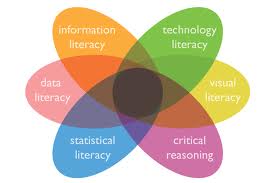
I recognize the importance of all these literacies and support all that is being done to improve the ability of student and adults to master them. However, as a member of ALA Committee on Literacy, I am ever mindful of what was once said at a committee meeting, “The house of literacy has many rooms, but the entrance is through text literacy.”
So we return to where we were in the mid-20th century. First and foremost, we need to be able to read text. And the rate of adult illiteracy is shocking.
In the U.S., 14% of adults over 16 read at or below the 5th grade level, and 29% read at the 8th grade level. The implications are huge. Among those with the lowest literacy rate, 49% live below the poverty level. A substantial portion of our prison population is composed of illiterates or low literates. (ProLiteracy)
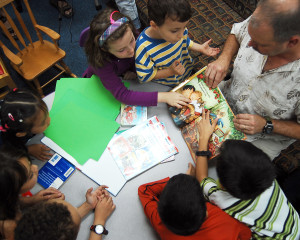 Although school librarians are highly trained to teach the other literacies mentioned, they also are committed to creating lifelong learners and readers by instilling a love of reading. The first Common Belief of the AASL Standards for the 21st-Century Learner is Reading is a window to the world. It then explains, “Reading is a foundational skill for learning, personal growth, and enjoyment.”
Although school librarians are highly trained to teach the other literacies mentioned, they also are committed to creating lifelong learners and readers by instilling a love of reading. The first Common Belief of the AASL Standards for the 21st-Century Learner is Reading is a window to the world. It then explains, “Reading is a foundational skill for learning, personal growth, and enjoyment.”
Students are taught to read in class. For some, the skill is difficult and they are turned off. This is the route to illiteracy and low literacy. In the school library, surrounded by books at all levels, guided by a school librarian, adept at connecting a student with just the right book, students discover that reading can be fun. We need more, not fewer school librarians. The wealth of our nation depends on it.
 We have just finished the annual Banned Books Week and social media sites have been filled with lists of titles that have been banned currently or over the years. Librarians and non-librarians have expressed their incredulity and horror over what has been challenged or removed from library shelves. I, too, joined in the frenzy of re-posts. It is important to raise awareness of the efforts of some to deprive the many of whatever they find offensive
We have just finished the annual Banned Books Week and social media sites have been filled with lists of titles that have been banned currently or over the years. Librarians and non-librarians have expressed their incredulity and horror over what has been challenged or removed from library shelves. I, too, joined in the frenzy of re-posts. It is important to raise awareness of the efforts of some to deprive the many of whatever they find offensive
But the issue is far larger. Banned Books Week is a personal reminder of why I am so proud to be a librarian. Chatter on the social media is easy, but being a bastion for intellectual freedom and freedom of access to information can be both challenging and frightening. While our everyday workload may be hard, it is nothing compared to what it takes to stand against censors.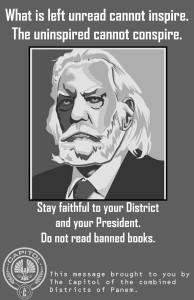
Every year ALA and its divisions, including AASL (American Association for School Librarians) present an Intellectual Freedom Award to a librarian who stood up for ALA’s Code of Ethics and most particularly the Library Bill of Rights. Most state library associations have the same award. I have known at least one recipient personally, and while she got support from ALA’s Office of Intellectual Freedom and from her state organization, she said it was lonely and she was often fearful. She had a positive outcome, and the challenged books were re-instated in the library. Even better, she was a role model for her students. But, it was a very difficult time.
Sitting alone and selecting which books to order, librarians quietly face the dilemma of whether to adhere to the strong beliefs which are a foundation of our profession or take the easy way out. Many decide it isn’t worth the risk, rationalize their budgets aren’t large enough to buy all the books they would like, and pass over titles on LGBTQ subjects or other hot-button issues in their communities. No one knows of their individual decisions. There are no consequences for their action or inaction – except for a student or patron who doesn’t get access to much needed information and/or reassurance.
Those who would remove books often point to librarians’ decisions on what to purchase and what not to buy, claiming it, too, is censorship, but they miss a fundamental point. Book selection—which is what librarians do—is based on the merits of the work as a whole and whether it serves the library’s population. Censorship focuses on snippets—a word, picture, or idea-found unacceptable. It seeks to impose what should be a personal decision on all the library’s users. As a guide, many of us hold that every library should have something that offends someone – including the librarian who purchased it. I have had works by Klansman and other equally personally offensive titles in my libraries because it was my responsibility to present a broad range of viewpoints.
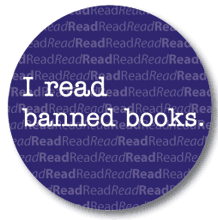 So as another Banned Books Week comes to an end, I want to honor and celebrate the courageous librarians who take on the toughest aspect of our profession. I hope those of you who are librarians are equally brave. For non-librarian of this blog, I wish you have these librarians in charge of the library you use.
So as another Banned Books Week comes to an end, I want to honor and celebrate the courageous librarians who take on the toughest aspect of our profession. I hope those of you who are librarians are equally brave. For non-librarian of this blog, I wish you have these librarians in charge of the library you use.
 Check out Annie Murphy Paul’s post about COMPUTATIONAL THINKING. It’s got some terrific insights.
Check out Annie Murphy Paul’s post about COMPUTATIONAL THINKING. It’s got some terrific insights.
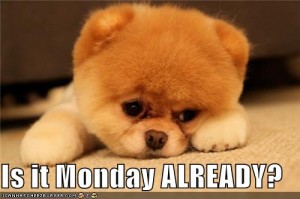 It’s the weekend as I write this. If you are like so many others, you are cramming in a week of errands and household tasks into two short days. And when you go back to work on Monday, you begin already frazzled since you had little or no time to relax.
It’s the weekend as I write this. If you are like so many others, you are cramming in a week of errands and household tasks into two short days. And when you go back to work on Monday, you begin already frazzled since you had little or no time to relax.
School librarians continually comment on how overwhelmed they are. Teachers are saying the same thing. Common Core and more responsibilities, more students in a class, and unclear new methods evaluation combine to keep you off balance, constantly shifting from one thing to the next. We aren’t alone. People in many other careers are feeling the same way. Information overload is part of it. We are connected nearly 24/7 and most of us want the connections. We Tweet, Post, check apps whenever we have a “free” moment.
Two weeks ago, my blog was on Time Management. I am skilled at it, but as with everything else in my life, I am not perfect. The past few days have been something of test under fire. I am teaching an online course and we are at capacity for students. Of course, my schedule had been filled before the course with my normal work.
I realized I was beginning to feel overwhelmed. Recognizing it was great because then I could begin to deal with it. First, I looked at what had to get done then determined which tasks were an immediate priority and which could be handled later. There was a lot to do, but it was definitely manageable.
I also remembered what for me was a key lesson in Peter Bregman’s 18 Minutes: Find Your Focus, Master Distraction, and Get the Right Things Done. It was to step back and take time away from the tasks. No matter how crowded my day is, I walk. If I go to the gym in the morning, I take a long walk (40-60 minutes) in the afternoon. If I don’t go to the gym, I add in a 20 minute walk to replace it. I already have a plan to be able to get my walks in when the weather gets bad. It clears my head, allows me to think or let my mind wander. I return refreshed and am more productive than if I chained myself to the computer without a break.
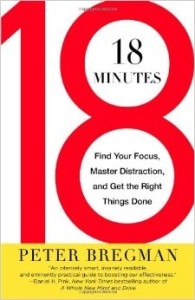 And always, family and friends take precedence. I have lunches with friends. I stop what I am doing when family members come over. I enjoy the gifts I have in my life. Work will wait. And as I said two weeks ago, “everything will get done, it always does.”
And always, family and friends take precedence. I have lunches with friends. I stop what I am doing when family members come over. I enjoy the gifts I have in my life. Work will wait. And as I said two weeks ago, “everything will get done, it always does.”
What do you do to manage your moments (days, weeks, months) of overwhelm?
 Yes, this is a new feature on THE SCHOOL LIBRARIAN’S WORKSHOP page. We want you to stay informed of interesting articles around the web, so if you see a post with the TTK opening… it’s a quick post with a link that I think you’ll find helpful to keeping you indispensable!
Yes, this is a new feature on THE SCHOOL LIBRARIAN’S WORKSHOP page. We want you to stay informed of interesting articles around the web, so if you see a post with the TTK opening… it’s a quick post with a link that I think you’ll find helpful to keeping you indispensable!
Look for these once or twice a week!
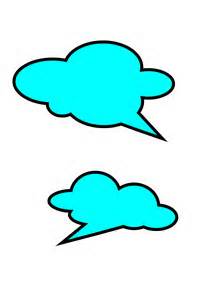 As a writer of books for school librarians (and School Librarian’s Workshop) as well as being the author of Woven through Time, a YA fantasy, I am well aware of the importance of choosing the right words to convey my meaning. But words in everyday communications are important and powerful, and we all need to tune into what we are saying, how we are saying it, and what others are saying.
As a writer of books for school librarians (and School Librarian’s Workshop) as well as being the author of Woven through Time, a YA fantasy, I am well aware of the importance of choosing the right words to convey my meaning. But words in everyday communications are important and powerful, and we all need to tune into what we are saying, how we are saying it, and what others are saying.
I am in the first weeks of teaching an online graduate course for school librarians on managing the school library and my students are wrestling with the words for their mission, vision, and philosophy statements. Although you may not have those statements written down for your library, you communicate them each day in dealing with students, teachers, administrators, and any who walk through your library doors.
You need powerful words to reinforce what you are doing. “Empowering Learners” is the title of the AASL Guidelines for library programs. Those are strong words. Empowering shows how we teach the tools for future success. Learners is far better than students, since it implies we are learners—and must be for our entire life. Contrast that with “supporting or enriching the curriculum.” The AASL phrase is active. What too many librarians say is passive. It’s not what is meant, but it is what is communicated. Words are powerful.
If you want to be perceived as indispensable, you must be pro-active, interconnected with what is happening in the school, embedded in the curriculum. And no one will give that to you. You claim it by providing the information teachers and administrators need. Don’t wait to be asked. You won’t be. Be the person with the answers—or the one everyone knows can find the answers.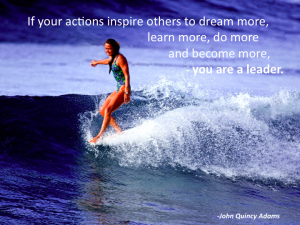
Watch how you express yourself. I had a co-librarian who said in conversation, “you teachers,” and with those two words she separated herself from the faculty. Never minimize the teachers’ workload and no matter what the truth is, don’t suggest you have more on your plate than they do.
What you think also gets communicated. If you are thinking the teachers regard you as a babysitter it affects how you deal with students. Without realizing it, any negative attitude you have is conveyed through your body language and often in the tone of your voice. It gets picked up, usually subliminally.
Listen to what you say. Note your reaction to others and whether you got the message from their words or from non-verbal signals. When you catch yourself with a negative attitude towards a teacher, student—or administrator, quickly reframe it into something positive. You will find it does make a difference.
 A t-shirt slogan reads, “I was put on this earth to accomplish certain things. At the rate I am going, I will never die.” Have you felt this way too? Too much to do and too little time to do it is a constant refrain for most people. The stress it creates is wearing on our bodies and our relationships. Family and friends get short shrift as we tackle an increasing mountain of tasks.
A t-shirt slogan reads, “I was put on this earth to accomplish certain things. At the rate I am going, I will never die.” Have you felt this way too? Too much to do and too little time to do it is a constant refrain for most people. The stress it creates is wearing on our bodies and our relationships. Family and friends get short shrift as we tackle an increasing mountain of tasks.
The tasks won’t go away, but they, and your time, can be managed better. Instead of going through life with a fire extinguisher and duct tape – putting out fires as they come up and patching problems – look at your life and tasks as a whole. Divide your responsibilities and interests into two –family and friends, and your job. In both cases you need to remind yourself of your priorities. List the two or three top ones. More will drive you crazy.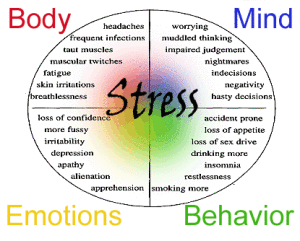
This is what works for me.
Before you go home each day or first thing in the morning—whatever works best for you—create a list of what needs to be done. (For some this is best done on a weekly basis, for me it’s usually for today and tomorrow.) Pen and paper or digital doesn’t matter. Again, it needs to meet your needs. Subdivide them by area. For example, it might be classes (teaching and preparing), communicating (updating website, blogging, reports to administrators), and, hopefully, outreach (group or person you are targeting for collaboration and/or building a relationship leading to advocacy. Your personal list covers shopping, time with family (homework with kids, dinner out with spouse), and self-care (exercise, TV-watching, or whatever relaxes you – many of you know of my solitaire addiction).
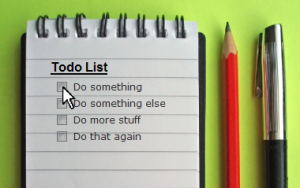 Place an asterisk next to the two most important items on your list. Then start your day. Although you might not get to them immediately, knowing they are most important, you will attend to them. You probably won’t get to everything on your list in the time you allotted. As noted earlier, too much to do, and too little time to do it and new things are always popping up. You are likely to find that some you didn’t get to become a high priority a bit down the road. That’s fine. If you need to, note what got in your way—a teacher or student needing immediate help that takes more time than expected or a crisis at home. Life has a way of upsetting our best plans.
Place an asterisk next to the two most important items on your list. Then start your day. Although you might not get to them immediately, knowing they are most important, you will attend to them. You probably won’t get to everything on your list in the time you allotted. As noted earlier, too much to do, and too little time to do it and new things are always popping up. You are likely to find that some you didn’t get to become a high priority a bit down the road. That’s fine. If you need to, note what got in your way—a teacher or student needing immediate help that takes more time than expected or a crisis at home. Life has a way of upsetting our best plans.
Don’t beat yourself up for what didn’t get done. Look at what you did accomplish. My life is filled with deadlines. I have accepted the fact that no matter what I do there are only 24 hours in the day. I do need to sleep and being sleep deprived makes me less efficient. Some days I am lazier than others, and that’s OK. I am human. And the most important lesson I have learned, is “everything important will get done—it always does.”
Do you have a system that works for you?
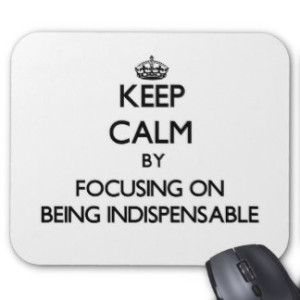 On a personal level, no word resonates more with school librarians than “indispensable.” It’s what most of us believe we are, what some of us fear we aren’t, and far too many feel is not recognized by administrators, teachers, parents,—and legislators. The bottom line is, we ALL must believe it, demonstrate it, and do so in such a way that our stakeholders believe it as well.
On a personal level, no word resonates more with school librarians than “indispensable.” It’s what most of us believe we are, what some of us fear we aren’t, and far too many feel is not recognized by administrators, teachers, parents,—and legislators. The bottom line is, we ALL must believe it, demonstrate it, and do so in such a way that our stakeholders believe it as well.
The Mission Statement of School Librarian’s Workshop is:
To be your library program’s silent partner, keeping you informed, inspired, and invaluable – a leader in your building – indispensable to your students, teachers, administrators and community.
The key word, of course, is “indispensable”, but the operative word is “leader.” One sure way to be recognized as indispensable is to be seen as a building leader—an integral part of the educational community, working with all components to achieve the results they want effectively and efficiently.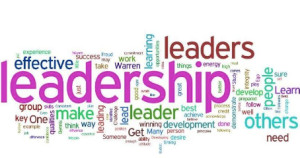
The first step is to know what makes your school library program and your role within it unique. You must provide a service or solution to others’ problems that no one else can do. Can you identify what unique skills and knowledge you bring? If you can’t do it, no one else can.
Posted infographics can be one way to get the message out. This pin by Joyce Valenza and Gwyneth Jones http://www.pinterest.com/pin/438678819923058694 and this slideshare from Jennifer LaGarde (Library Girl) http://www.slideshare.net/jlagarde/librarians-are-ready can get you started. Search for more on Google images—and then create your own. If you are unsure how to do it, look for an article on it in the upcoming December 2014/January 2015 issue of School Librarians Workshop.
 Infographics alone won’t help if you are not delivering. Look at what contributions they highlight. Do you do these? If you don’t, why not? How can you integrate them into your program and then get the word out. Many successful school librarians are creating LibGuides available to parents as well as those for students and teachers. These aids, available 24/7, promote your program and how you are integral to student learning.
Infographics alone won’t help if you are not delivering. Look at what contributions they highlight. Do you do these? If you don’t, why not? How can you integrate them into your program and then get the word out. Many successful school librarians are creating LibGuides available to parents as well as those for students and teachers. These aids, available 24/7, promote your program and how you are integral to student learning.
One of the participants in my recent e-course Being Indispensable: A School Librarian’s Guide to Proving Your Worth and Keeping Your Job is heading up a School Librarian Interest Group for NEFLIN (Northeast Florida Library Information Network). For this year their word is “Indispensable.” You might want to adopt the idea. Focus on all ways you can demonstrate you and your program are vital and Indispensable.